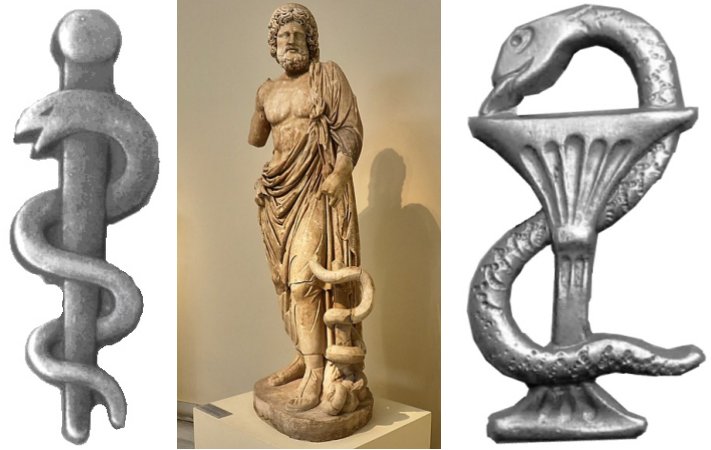Why Is A Snake Symbol Of Medicine And Pharmacies?
Ellen Lloyd - AncientPages.com - The snake has been used as a symbol by pharmacies and doctors for a very long time. The serpent is a symbol of medicine and through the iconography of pharmaceutical history, snakes appear wrapped around a staff or a bowl.
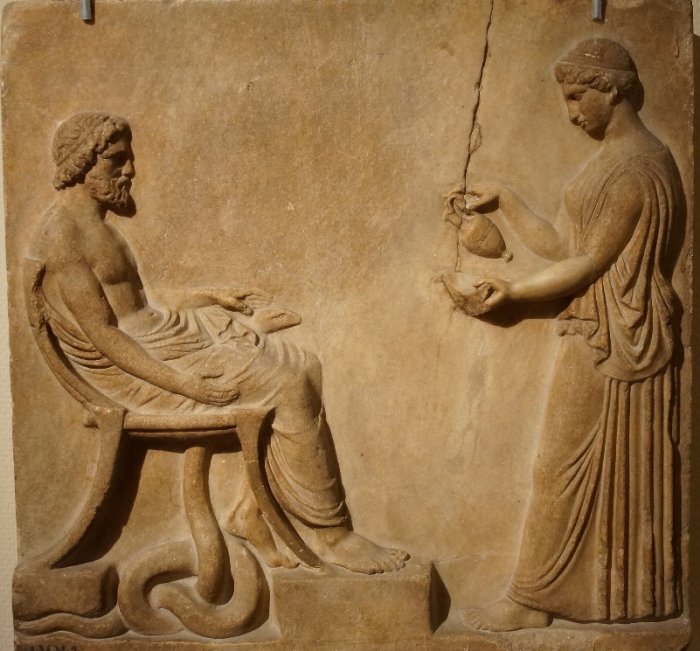 Asclepius and Hygieia. Asclepius with his staff is accompanied by his daughter Hygieia, who pays homage to him by offering wine as a libation from a bowl. Marble, Italy, 1st century AD. Image credit: NearEMPTiness - CC BY-SA 4.0
Asclepius and Hygieia. Asclepius with his staff is accompanied by his daughter Hygieia, who pays homage to him by offering wine as a libation from a bowl. Marble, Italy, 1st century AD. Image credit: NearEMPTiness - CC BY-SA 4.0
There are various types of snakes used as medicine symbols. Modern pharmaceutical signs have a long history going back to ancient Greece.
Rod Of Asclepius – Symbol Of Medicine
According to the Greek myths, Asclepius, the Greek God of medicine learned the art of healing from both his father Apollo and the centaur Cheiron. In time, he became so skilled in surgery and the use of drugs that he was revered as the founder of medicine. A major sanctuary was dedicated to him at Epidaurus, the place where he was born.
It was believed that Asclepios had the power to rise from the dead.
Legend tells that Zeus was worried that Aesculapius would make mankind immortal because of his healing power. Out of fear, he killed Aesculapius with a lightning bolt. Temples were built for Aesculapius, and seemingly dead serpents were found inside.
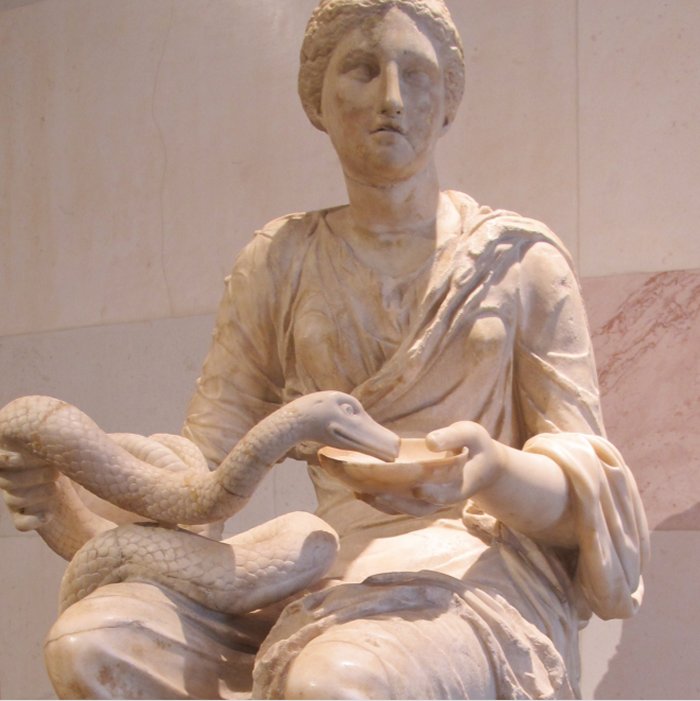 Goddess of good health, cleanliness, and sanitation. 1st century Roman statue of the goddess.
Goddess of good health, cleanliness, and sanitation. 1st century Roman statue of the goddess.
Image credit: I, Sailko - CC BY-SA 3.0
When these serpents were picked up and dropped, however, they slithered away. To people, this was interpreted as that the serpents were brought back to life by the healing powers of Aesculapius, which ultimately caused them to be associated with healing. Tame snakes were kept in his temples as this animal was regarded as a symbol of regeneration.
From about 300 B.C. onwards, the cult of Asclepius grew very popular and pilgrims flocked to his healing temples (Asclepieia) to be cured of their ills. Sacred Asclepion of Pergamum was an ancient healing center and the world's first psychiatric hospital.
The Rod of Asclepius, also known as the Staff of Asclepius, a serpent-entwined rod wielded by the Greek god Asclepius is today associated with medicine and health care. It’s the symbol of medicine, but it’s often confused with the staff of the god Hermes, the caduceus.
Bowl Of Hygieia
Hygieia, Goddess of Health hygiene who was the daughter of Asclepius tended to his temples. Her symbol became a bowl containing a medicinal potion, with the serpent of Wisdom drinking from it. She is a goddess of health, healing, and hygiene.
Left: Rod of Asclepius. Credit: Piotrus - Public Domain - Middle: Statue of Asclepius. Credit: George E. Koronaios - CC BY-SA 4.0 - Right: Bowl Of Hygieia - Piotrus - Public Domain
The Bowl of Hygieia has become an international emblem representing pharmacies. Hygieia, one of the daughters of Asklepios (Asclepius) and granddaughter of Apollo, played an important role in the cult of Asklepios as a giver of health.
Modern people associate the snake with poison, but the animal had a powerful symbolic meaning to our ancestors. Snakes have been used for worship, magic potions and, medicine, and they have been the symbol of love, health, disease, medicine, pharmacy, immortality, death, and even wisdom since ancient times.
The story of the Serpent People and their guidance is known worldwide for as long as anyone can remember. Collectively, they were all known as the Serpents of Wisdom and their great contribution to the global development of our planet can never be erased. So, it’s not surprising that the serpent was worshipped in many corners of the world.
Updated on June 23, 2021
Written by - Ellen Lloyd – AncientPages.com
Copyright © AncientPages.com All rights reserved. This material may not be published, broadcast, rewritten or redistributed in whole or part without the express written permission of AncientPages.com
More From Ancient Pages
-
 New Study Sheds Light On The Phenomenon Of Female Jewish Slavery And Uncovers Gang Rape In Livorno’s Slave Prison
Archaeology | May 18, 2022
New Study Sheds Light On The Phenomenon Of Female Jewish Slavery And Uncovers Gang Rape In Livorno’s Slave Prison
Archaeology | May 18, 2022 -
 Limestone Sarcophagus, Ushabti Figures Unearthed In Minya’s Al-Gharafa Area, Egypt
Archaeology | Oct 3, 2020
Limestone Sarcophagus, Ushabti Figures Unearthed In Minya’s Al-Gharafa Area, Egypt
Archaeology | Oct 3, 2020 -
 230,000-Year-Old Human Remains Discovered In Eastern Africa – Rewrite Ancient History
Archaeology | Jan 14, 2022
230,000-Year-Old Human Remains Discovered In Eastern Africa – Rewrite Ancient History
Archaeology | Jan 14, 2022 -
 Fragment Of Unique Egyptian Sphinx Unearthed In North Israel
Archaeology | Jul 13, 2013
Fragment Of Unique Egyptian Sphinx Unearthed In North Israel
Archaeology | Jul 13, 2013 -
 Naupa Huaca: The Enigmatic Stone Temple In A Cave In Peru
Featured Stories | Sep 10, 2020
Naupa Huaca: The Enigmatic Stone Temple In A Cave In Peru
Featured Stories | Sep 10, 2020 -
 Incredible 700-Year-Old Tombs With Beautiful Decorations And Carved Bricks Found In Shandong, China
Archaeology | May 22, 2023
Incredible 700-Year-Old Tombs With Beautiful Decorations And Carved Bricks Found In Shandong, China
Archaeology | May 22, 2023 -
 On This Day In History: The Battle of Blore Heath – Sep 23, 1459
News | Sep 23, 2015
On This Day In History: The Battle of Blore Heath – Sep 23, 1459
News | Sep 23, 2015 -
 Ancient Expensive Roman Domus With Beautiful Mosaic Unearthed In Rome
Archaeology | Dec 17, 2023
Ancient Expensive Roman Domus With Beautiful Mosaic Unearthed In Rome
Archaeology | Dec 17, 2023 -
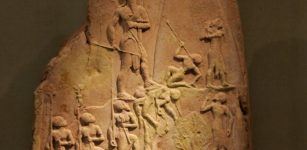 Did Climate Change End The Akkadian Empire?
Civilizations | Jul 17, 2019
Did Climate Change End The Akkadian Empire?
Civilizations | Jul 17, 2019 -
 Ancient Biblical Manuscript M.910 We Are Afraid To Open May Contain A Surprise
Archaeology | Feb 19, 2018
Ancient Biblical Manuscript M.910 We Are Afraid To Open May Contain A Surprise
Archaeology | Feb 19, 2018 -
 Potlatch: Ancient North American Indian Tradition Of Very Generous Gift Giving
Ancient Traditions And Customs | Sep 12, 2016
Potlatch: Ancient North American Indian Tradition Of Very Generous Gift Giving
Ancient Traditions And Customs | Sep 12, 2016 -
 Who Was The The Mysterious Lady Of Bietikow And What Had She In Common With Ötzi Iceman?
Archaeology | Nov 6, 2020
Who Was The The Mysterious Lady Of Bietikow And What Had She In Common With Ötzi Iceman?
Archaeology | Nov 6, 2020 -
 Asenath And The Golden Tablet That Changed Her Destiny
Biblical Mysteries | May 10, 2019
Asenath And The Golden Tablet That Changed Her Destiny
Biblical Mysteries | May 10, 2019 -
 Meet SPOT – Robot Dog Deployed To Guard The Ancient Ruins Of Pompeii
News | Apr 1, 2022
Meet SPOT – Robot Dog Deployed To Guard The Ancient Ruins Of Pompeii
News | Apr 1, 2022 -
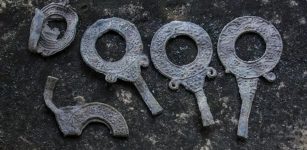 Five Ancient Mirror Frames, Ceramics Factory Found In Intriguing Roman Villa In Pavlikeni, Bulgaria
Archaeology | Mar 13, 2018
Five Ancient Mirror Frames, Ceramics Factory Found In Intriguing Roman Villa In Pavlikeni, Bulgaria
Archaeology | Mar 13, 2018 -
 Hidden Inca Water System Beneath The Machu Picchu Jungle Discovered By LIDAR
Archaeology | Mar 11, 2022
Hidden Inca Water System Beneath The Machu Picchu Jungle Discovered By LIDAR
Archaeology | Mar 11, 2022 -
 Ankhesenamun – Mysterious Death Of Tutankhamun’s Wife Ended The True Amarna Bloodline
Featured Stories | Mar 23, 2018
Ankhesenamun – Mysterious Death Of Tutankhamun’s Wife Ended The True Amarna Bloodline
Featured Stories | Mar 23, 2018 -
 Ten Ancient Jugs May Reveal The Location Of The Biblical Tabernacle
Archaeology | Jul 21, 2017
Ten Ancient Jugs May Reveal The Location Of The Biblical Tabernacle
Archaeology | Jul 21, 2017 -
 Extraordinary Discovery: Clay Vessel With Sour Soup For The Gods Found In Medieval Hut
Archaeology | Jun 4, 2017
Extraordinary Discovery: Clay Vessel With Sour Soup For The Gods Found In Medieval Hut
Archaeology | Jun 4, 2017 -
 Bonobos And Chimps: What Our Closest Relatives Tell Us About Humans
Featured Stories | Apr 6, 2023
Bonobos And Chimps: What Our Closest Relatives Tell Us About Humans
Featured Stories | Apr 6, 2023

